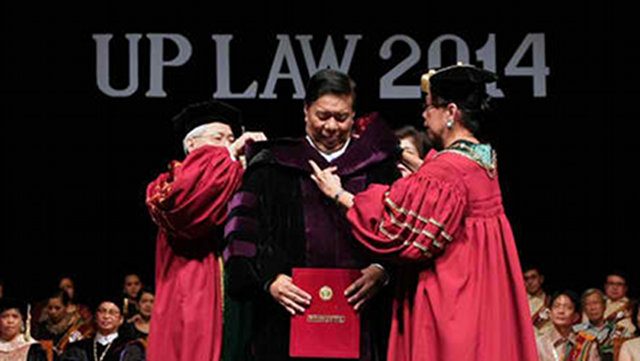SUMMARY
This is AI generated summarization, which may have errors. For context, always refer to the full article.

MANILA, Philippines – The Supreme Court has the final say.
Senate President Franklin Drilon urged both critics and proponents of the Philippines’ military deal with the United States to bring it before the Supreme Court (SC) to settle whether or not the agreement requires Senate approval.
Following a heated debate on the nature of the deal, Drilon said it is best to let the high court issue a definitive ruling on the Enhanced Defense Cooperation Agreement (EDCA).
“I would urge everyone to go to the Supreme Court and let the Supreme Court finally decide whether this is a treaty that will require ratification of the Senate or an executive agreement which can be implemented by a mere signature of the executive branch,” Drilon told reporters on Tuesday, April 29.
While his colleagues remain divided on the deal, Drilon did not issue a position on the matter. He said there is still no schedule for the executive branch to send a copy of the agreement to the Senate. The deal was only made public on Tuesday, a day after it was signed. (Read the full text here.)
“In fact, I have not seen the copy of the agreement, only the Frequently Asked Questions published in the papers today,” said the staunch administration ally.
Drilon said the Senate oversight committee on the Visiting Forces Agreement can ask the executive branch to explain the new deal, but it will still remain unclear whether Senate approval is needed.
“Whether or not we can ratify depends on the executive branch if they will send to us for ratification. If the document is not sent to us, then we will have nothing to ratify officially. Then I will go back to my suggestion: bring it to the Supreme Court, which is the ultimate arbiter as whether or not this is a treaty or an executive agreement,” said Drilon, a former justice secretary.
Signed ahead of the state visit of US President Barack Obama, the agreement gives US troops greater access to Philippine bases, and allows them to build facilities in these bases with the consent of Filipino officials.
Senate foreign relations committee chairperson Miriam Defensor-Santiago criticized the signing of the deal, calling it an “unfair surprise on the Philippine Senate.” Santiago believes the deal constitutes a treaty and should have the concurrence of the Senate. Senators Alan Peter Cayetano and Ralph Recto supported her position.
Leftist lawmakers in the House of Representatives already announced they would question the deal before the high tribunal.
Senate defense committee chairman Antonio Trillanes IV and Cynthia Villar echoed the position of Malacañang that the deal is a mere executive agreement implementing past treaties.
The 1987 Constitution states that foreign bases shall not be allowed except under a treaty that the Senate approved.
Section 25, Article XVIII, of the Constitution reads:
“After the expiration in 1991 of the Agreement between the Republic of the Philippines and the United States of America concerning military bases, foreign military bases, troops, or facilities shall not be allowed in the Philippines except under a treaty duly concurred in by the Senate and, when the Congress so requires, ratified by a majority of the votes cast by the people in a national referendum held for that purpose, and recognized as a treaty by the other contracting State.”
‘Negotiations require secrecy’
Drilon also responded to criticism that the deal lacked transparency. Santiago, former Senator Joker Arroyo, and former senators who voted to close down the US bases in 1991 pointed out that the public and the Senate were “kept in the dark” about the agreement.
The Senate President said negotiation is primarily the duty of the executive branch.
“As you will recall in the bases treaty, there was negotiation between the US panel and the Philippine panel and, afterward, the treaty was submitted for ratification by the Senate. That is the nature of the negotiation,” he said.
“You cannot expose your positions publicly. You have to negotiate. The participation of the Senate is in the ratification of the document,” Drilon added.
Drilon also did not take issue with Obama’s failure to give a categorical commitment that the US will defend the Philippines if its territorial dispute with China escalates into armed conflict.
The Philippines is a treaty ally of the US following the ratification of the 1951 Mutual Defense Treaty. Unlike with Japan, Obama did not give a firm response to questions on whether or not his country’s treaty with the Philippines covered Manila’s maritime dispute with Beijing in the South China Sea.
Drilon said, “I expected that he will assert, emphasize the support of the US on the process that the Philippines has followed, the conduct of the nations in this part of the world should be rules-based and supporting the arbitration. I expected that and I’m glad it was articulated very clearly by President Obama: that they are supporting the position of the Philippines that this matter be brought to international arbitration.”
At the start of his 4-nation tour of Asia, Obama said in Tokyo that US troops will defend Japan if China tried to take disputed islands in the East China Sea by force.
While Obama made no such statement in Manila, he said US commitment to the Philippines was “ironclad.” – Rappler.com
Add a comment
How does this make you feel?
There are no comments yet. Add your comment to start the conversation.